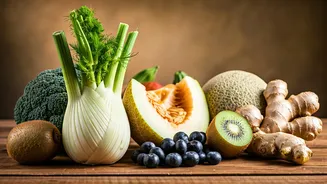Peppermint Power
Peppermint tea is a natural remedy, often praised for its ability to reduce gas and bloating. The active compound in peppermint, menthol, has relaxing
effects on the intestinal muscles. This helps to ease spasms and allows trapped gas to move more freely through the digestive tract. Furthermore, peppermint can also improve the flow of bile, which supports the digestion of fats. Try a cup of peppermint tea after meals or when you feel bloated for a soothing effect and natural digestive aid. Peppermint capsules are another method of integrating peppermint into your diet and can be found in most health stores.
Ginger's Digestive Aid
Ginger is another powerful natural remedy. It contains gingerol, a compound with anti-inflammatory and antioxidant properties. Ginger can alleviate bloating and gas by speeding up the digestive process, causing food to move through the intestines more quickly. It also helps to reduce inflammation in the gut, which can contribute to bloating and discomfort. Incorporating ginger into your diet is simple. Add fresh ginger to your cooking, sip on ginger tea, or take ginger supplements. It is known to combat nausea as well. Therefore, it is often recommended for people with nausea. Ginger can be especially effective after a large meal or when experiencing digestive unease.
Fennel Seeds Magic
Fennel seeds are frequently used in India, and many cultures to alleviate gas and bloating, thanks to their active compounds, such as anethole. Anethole helps relax the intestinal muscles, which reduces spasms and helps with gas. The seeds stimulate the production of digestive enzymes, which is important for the breakdown of food and prevents gas buildup. They also have a carminative effect, which means they help dispel gas from the digestive system. You can chew fennel seeds after meals. Otherwise, you can use them as a spice in cooking, or make a fennel seed tea. Moreover, fennel seeds are commonly used in various cuisines.
The Power of Yogurt
Yogurt, especially those containing live and active cultures or probiotics, provides beneficial bacteria to the gut, like Lactobacillus and Bifidobacterium. These probiotics help balance the gut flora, which can be disrupted by unhealthy diets or antibiotics. A healthy gut flora can support the breakdown of food, decrease gas production, and reduce bloating. For the best benefits, choose yogurt with live and active cultures and avoid those with added sugars, which can worsen bloating. It also makes for a healthy snack option or a great addition to breakfast. Look for plain yogurt and add your own fruits or honey.
Turmeric's Anti-Inflammatory Action
Turmeric, a spice popular in Indian cuisine, has potent anti-inflammatory properties due to its main active compound, curcumin. Inflammation in the gut can contribute to bloating and gas. Curcumin helps reduce inflammation, thus improving digestive comfort. Furthermore, turmeric supports the production of bile and the breakdown of fats, which can also help prevent gas. You can use turmeric in your cooking, add it to smoothies, or take supplements. For the best absorption, combine turmeric with black pepper, which increases the bioavailability of curcumin.
Pineapple's Digestive Enzymes
Pineapple contains bromelain, a group of enzymes that aid in protein digestion. Bromelain helps break down proteins more efficiently, which reduces the chance of undigested food in the gut, a common cause of gas and bloating. Pineapple also has anti-inflammatory properties that can soothe the digestive tract. Eating fresh pineapple or drinking pineapple juice before or after meals can help with digestion and reduce bloating. However, moderation is key, as high acidity might irritate some people.
Bananas for Relief
Bananas are rich in potassium, an electrolyte that helps regulate fluid balance in the body and can counter bloating caused by water retention. They also contain fiber, which supports healthy digestion and prevents constipation, a common cause of bloating. Moreover, bananas are easy to digest and a good source of energy. Eating a banana can relieve bloating by regulating the gut and preventing constipation, and is a great option for a light meal, or a snack. Including bananas in your daily diet is simple; add them to smoothies, eat them as a snack, or add them to cereal.
Cucumber for Hydration
Cucumber is primarily water and high in fiber, making it a great food for improving digestion and reducing bloating. Its high water content helps to flush out excess sodium, which often leads to water retention and bloating. Furthermore, cucumber contains compounds that can reduce inflammation in the gut, which can reduce gas and bloating. Eating cucumber raw in salads or as a snack offers a refreshing and hydrating way to soothe the gut. You can also add it to infused water to enjoy its benefits. It's also a great way to stay hydrated.
Asparagus' Diuretic Effect
Asparagus acts as a natural diuretic. It can help eliminate excess water, reducing bloating and swelling in the abdomen. Asparagus also contains inulin, a type of fiber that promotes the growth of beneficial gut bacteria, helping to maintain a healthy gut flora. Furthermore, it has antioxidant properties that can reduce inflammation in the digestive tract. Cooking asparagus lightly preserves its nutrients, making it easier for the body to digest. Adding asparagus to salads, stir-fries, or side dishes can support digestion and prevent bloating, by helping your body release any excess water. Many people enjoy asparagus because of its taste.
Watermelon's Hydration Properties
Watermelon, similar to cucumber, is high in water content, helping with hydration and reducing water retention. It also contains fiber, which supports healthy digestion and prevents constipation. The natural sugars in watermelon are easily digested, reducing the likelihood of gas production. Eating watermelon can help flush out excess fluids, relieving bloating and promoting overall digestive health. Enjoy it as a snack, add it to fruit salads, or blend it into a refreshing juice. It is important to note that consuming too much watermelon can cause some people to feel bloated because of the high fructose content. However, in general, it is a healthy option.














